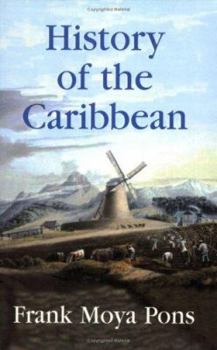History of the Caribbean: Plantations, Trade, and War in the Atlantic World
Select Format
Select Condition 
Book Overview
Academic paperback edition, which includes an extensive bibliographical essay. From the arrival of the first Europeans in the region until the 1930s, plantations-building their fortunes on sugar and... This description may be from another edition of this product.
Format:Paperback
Language:English
ISBN:1558764151
ISBN13:9781558764156
Release Date:August 2013
Publisher:Markus Wiener Publishers
Length:386 Pages
Weight:1.41 lbs.
Dimensions:0.9" x 5.9" x 8.8"
Related Subjects
Americas History Political Science Politics & Social Sciences Social Science Social SciencesCustomer Reviews
1 rating
Amazing Facts about the Caribbean
Published by Thriftbooks.com User , 16 years ago
This is a scholarly but thank goodness an extremely well-written book. Its author Professor Frank Moya Pons is recognized as "the most widely read historian of the Dominican Republic." Deeply steeped in the history of the Caribbean, his love for the region is quite evident. This comprehensive book covers over four hundred years of Caribbean adventures and misadventures from Columbus' first trip to the region to the 1930s. Moya Pons stops his analysis at the Great Depression because he feels the economy and realities of the area changed forever at that time. Moya Pons captures the excitement and anguish of those centuries while providing his readers unusual insight. His Caribbean encompasses all the myriad islands that so many bathe in romanticism. Given their present relative well-being it is hard to fathom how harsh life was first for slaves and later for indentured servants, and strapped emigrants. Fortunes made off their backs were enjoyed by a small European elite. Columbus stumbled upon the Caribbean while seeking a waterway to the Far East. He thought he was near India and thus dubbed the natives of the Caribbean as "Indians." Unfortunately these gentle people were quickly enslaved by the Spanish and forced to work in existing gold mines. Within a very few decades virtually all of them died. The Spanish weren't about to allow that to end their profitable exploitation. So they turned the Caribbean into a thriving home base for the African slave trade. Trade in human flesh would continue for hundreds of years in the Caribbean. It was an extended enterprise with some large plantations harboring upwards of 900 black slaves. Later slavery was extended to other parts of Latin America and the United States. Given cheap labor and a fertile natural world, the Caribbean blossomed creating gargantuan profits. The millions of slaves who made that possible did not benefit from the prosperity their labor produced. Further they and their descendants suffered inordinately during the bad times. The Spanish were joined and abetted by English, Dutch, French and other interests. They were motivated by financial profit tinged with national pride. The stage was set for international intrigue and competing European nationalistic ambitions so well covered in this book. Further European wars, the American and the French revolutions, thousands of miles away all had significant repercussions in the Caribbean and its development. An underlying theme of this book is the importance of "the evolution of sugar plantations as the dominant integrating force of Caribbean economic history." The economies of ever so many islands became very similar despite linguistic, political and ecological variations. Sugar plantations, established in most islands dominated the region's economy. The Caribbean became as Moya Pons artfully writes, "the most important supplier of sucrose, an efficient source of calories which, once tasted, the modern world could not





